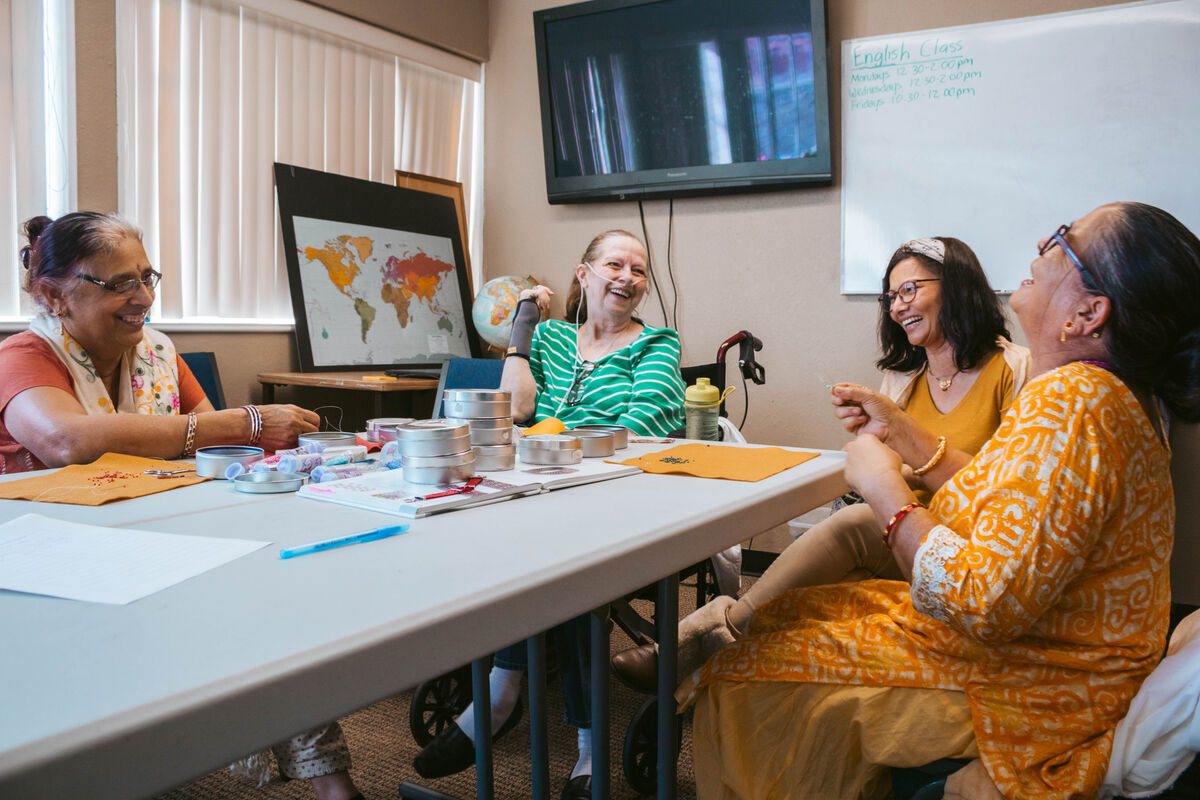By Romanita Hairston, CEO
The M.J. Murdock Charitable Trust exists to build capacity in nonprofits driving innovative and sustainable outcomes across the Pacific Northwest. This mission statement is derived from the wishes laid out by our benefactor, Jack Murdock, who, following his passing, directed three Trustees to establish a charitable trust “to nurture and enrich the educational, cultural, social, and spiritual lives of individuals, families, and communities.” As an innovator and entrepreneur himself, Jack had an eye for the projects and people who could create real change around them. Change that lasted, change that benefited all, and change that addressed the entire needs of an individual: mental, emotional, physical, and spiritual.
As Jack looked at the communities around him, he saw the importance of spirituality and the benefit of cultivating and expressing faith. A spiritual man himself, he donated to a variety of faith-based groups that created opportunities for connection with the divine, as well as to secular groups that aligned with his values. For Jack, the important factor in his giving was that the organization served the common good and worked to create strong pathways to flourishing for all individuals. He knew that when it comes to building a better world for all, everyone should be included in this work.
In following Jack’s example and instruction, the Murdock Trust has become one of few foundations in the region to support both faith-based and secular organizations. Led by the guiding light of our organizational values (which is really just that still-lit torch of Jack’s instructions), we have funded projects based on the strength of their proposal and the benefit to the common good. In doing so, our giving has generally been to 30% faith-based organizations and 70% secular organizations.
In an increasingly complex social landscape, which can include distrust of faith institutions, it is worth thinking critically about the value and validity of faith communities that contribute positively to the common good. I’d like to explore both the historic and current role of faith-based nonprofits as a way to engage in this conversation. Ultimately, whether or not you are a person of faith yourself, I, like Jack did, believe that we all have reason to care about the flourishing of faith-based nonprofits.
Historic Role of Faith-Based Nonprofits #
People have helped other people apart from religious motivations throughout history, but the historical development of nonprofits is inextricably tied to religious groups. As medical historians Louise Cilliers and Francois Retief write, “It is to the Christians that one must turn for the origin of the modern hospital.” After Fabiola, a penitent 4th-century widow from Rome, founded the first hospital, monastic orders went on to establish infirmaries in monasteries, which eventually expanded to public hospitals financed by cities, churches, and private sources. In the Islamic world, this led to magnificent hospitals, leprosariums, and more – the foundations of modern healthcare.[i]
Housing stability, immigration resettlement, and other humanitarian efforts also have religious groups to thank. The International Red Cross was founded in 1863 on Christian principles. The Hebrew Immigrant Aid Society was founded in 1884 to support those newly arrived in the United States. Direct Relief, the YMCA, B’nai B’rith, World Vision, and so many other organizations that serve a variety of community needs were founded with faith convictions. In the United States alone, we are indebted to thousands of faith groups in local communities, known and unknown to us today, for many of the common good benefits we now take for granted. As one historian writes, “Almost all modern social services can be traced back to roots in religious organizations.”[ii]
Historically, faith-based nonprofits have played a critical role in meeting society’s needs. But since the social reform movements of the 20th century have created a social landscape where everyone can work toward causes they believe in, what benefit do faith-based nonprofits bring now? Can we not entrust hospitals and immigration resettlement groups to do good work apart from religious convictions? Do after-school programs and summer camps need to be based in faith principles? This leads me to a second, more personal, observation.
Current Role of Faith-Based Nonprofits #

As CEO of the Murdock Trust for the last two years, and as a consultant and board member, I have personally witnessed the fruit of a nonprofit sector that continues to celebrate the contributions of faith groups. As a senior leader in a Christian nonprofit earlier in my career, I experienced the impact of an organization that became a world leader in serving the most vulnerable, motivated and inspired by faith.
These experiences have taught me that people of faith can be uniquely motivated to see gardens where others see deserts, to seek justice where others seek revenge, and to seek peace where others make war. This love of God and love of neighbor fosters a commitment to community and the common good, contributing to the conditions for human flourishing. Because their desire for these things comes from something beyond them – a commandment from their holy Scriptures, a longing to see heaven come to earth, a deep desire for others to experience the divine if they choose – people of faith can have resilience, creativity, and an eye for innovation that sets them up for fruitful work. And they often have a strong network of congregational support, volunteers, and church partners that are similarly motivated for that cause, widening and deepening their potential impact. Like Jack, I recognize the value of these groups right alongside the value of secular nonprofits who have also created incredible and sustainable change in their communities.
The Challenge of Failure #
I would be remiss to write this and not address the concern I often hear when others consider supporting faith-based groups: a concern regarding some of the very public and apparent failures of some faith institutions. These failures cannot and should not be denied. They are a reality that includes another: that institutions of faith, while run by people who believe in a higher power, are not immune to failure.
And yet should we cast them all aside because of the failures of some? I believe we should not. Instead, as Jack sought to do, I believe we should find those whose lights reflect the integrity and motivation of their call, the ones that add wind to the sails of those who work for the common good.
One valid part of this concern is the element of proselytization, or attempting to convert someone to your belief. While this term is often used in the context of religious conversion, it can apply to other areas like political or ideological beliefs. I like to say, “We all worship something!” Just as having an ideological framework as a secular organization does not discount their incredibly good work, so too should we see as valid the contributions of faith-based groups bringing flourishing to their communities. An inherently religious organization is not an inherently proselytizing organization. This can only be discovered through inquiry and exploration of their work. We should want to support good people motivated by faith doing good work when they are not forcing their faith on those being supported.
The Power of Success #
For our communities to thrive we need secular and sacred institutions working together to forge positive change, to fight intractable challenges, and to foster human flourishing. Different organizations have different strengths. In some arenas, sacred solutions prove more effective than secular ones, and in others, the inverse is true. What is important is acknowledging the value of faith in our tool chest against every force that denies the dignity and value of every human being. This is the power of faith to heal, and it is the heart of most religions. We should cheer on those who effectively serve to achieve those high ideals, whether motivated by morality or a mission from God.
Faith & Civic Engagement #
Given one area of our focus is civic engagement, I was recently intrigued by an article in The Atlantic that observed what Derek Thompson, the author, calls “The True Cost of the Churchgoing Bust.” Whatever your personal thoughts on churchgoing, we can perhaps agree that churches provide some social and civic benefits – weekly gathering spaces, opportunities for community engagement, social support, and common ground – that are in many cases being replaced now by virtual communities driven by online algorithms. Thompson, a self-professed agnostic, isn’t saying we need to flood back into churches, but he admits that something is going to be missed with a mass churchgoing exodus. I cannot help but think a similar thing would be true if we stopped caring about the flourishing of faith-based nonprofits. We do not all have to agree on the doctrines or dispositions of churches, synagogues, or other faith-based institutions, but we should all care about the ways they serve the common good.
So, I return to my simple conviction: there are reasons for us all to care about the flourishing of faith-based nonprofits, whether we are religiously motivated ourselves or not. Faith-based groups should be invested in the work of secular nonprofits. Non-faith groups should still long for the flourishing of the church across the street. Everyone is better served when we celebrate the contributions of individuals and groups across ideological and religious lines that are truly serving the common good.
[i] Cilliers L, Retief FP. The evolution of the hospital from antiquity to the end of the middle ages. Curationis. 2002 Nov;25(4):60-6. doi: 10.4102/curationis.v25i4.806. PMID: 14509111.
[ii] Garland, B. (1992). Church social work: An introduction. In Garland, B (Ed.). Church social work .(p1-17) Botsford, CT: NACSW







